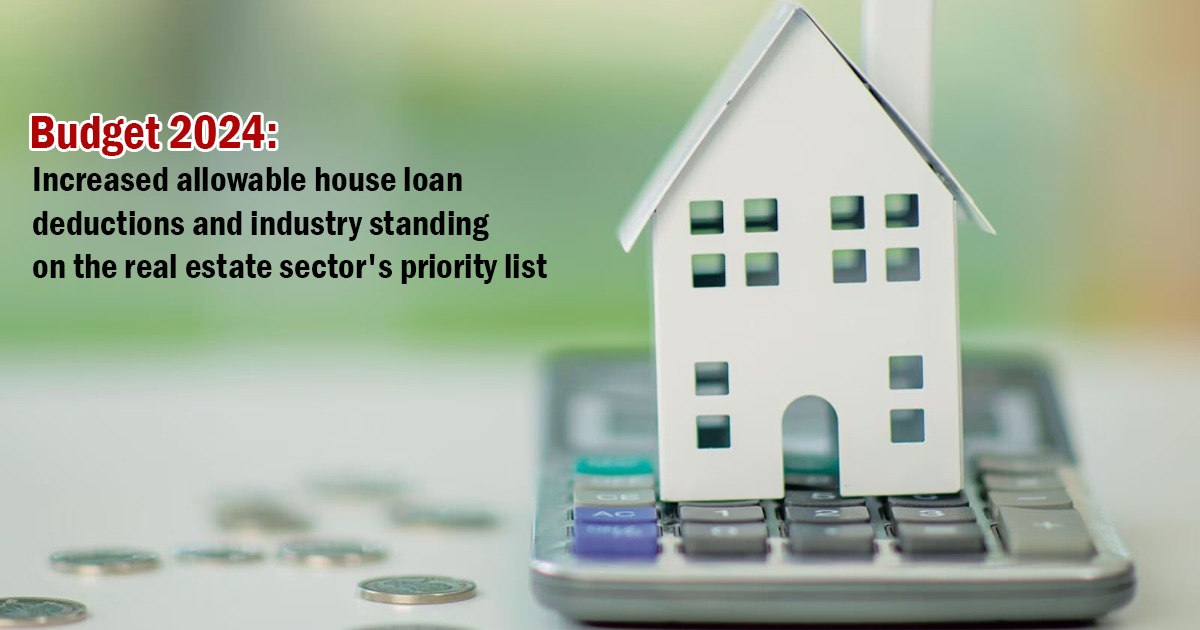Budget 2024: Increased allowable house loan deductions and industry standing on the real estate priority list
By Bricksnwall | 2024-01-10

Stakeholders
anticipate measures in the February 1 budget that will assist homeowners due to
the recent spike in property prices.
The real
estate industry is hopeful that the 2019 budget, which Finance Minister Nirmala
Sitharaman will review, will take into account their long-standing demands for
increased home loan deduction limits, a revised definition of affordable
housing, and industrial status for the sector.
Real estate
stakeholders are hopeful that some of their demands will be granted, despite
the finance minister's statement that there won't be "spectacular
announcements" when he presents a vote-on-account or interim budget on
February 1.
Deductions
for interest on a house loan
An important
anticipation is a rise in the Section 24B deduction cap for house loan interest
payments, which has been fixed at Rs 2 lakh per year since 2014.
Raising the
present tax credit of Rs 2 lakh on home loan interest to a minimum of Rs 5 lakh
is one of the main goals. Piyush Bothra, co-founder of Square Yards, stated,
"This adjustment is crucial to bolster housing demand, especially within
the affordable housing segment."
This demand
is justified by rising real estate costs, which have forced buyers to take out
larger loans.
We suggest
raising the tax credit on house loan interest in reaction to the recent rise in
real estate values. According to Dhruv Agarwala, group CEO of Housing.com,
Proptiger.com, and Makaan.com, "raising the current limit from Rs 2 lakh
to Rs 4 lakh could be a game-changer, helping to sustain the current strength
in demand."
Metros'
limits on affordable housing
When
purchasing a home, affordability is still a major concern. Numerous government
initiatives supporting affordable homebuyers have come to an end. Experts
recommended that in order to revitalise this important market, the government
think about announcing or restoring incentives.
Sales in the
much-discussed budget category dropped to roughly 20% in 2023 from over 30% in
2022 and nearly 40% prior to the pandemic, according to ANAROCK Research. In
the top seven cities, the share of housing supply in this category decreased
from almost 40% in 2019 to 18% in 2023.
"Over
the past one to two years, a number of interest stimulants that were provided
to consumers and developers in this sector have expired. Anuj Puri, chairman of
ANAROCK Group, stated, "It is essential to revive and extend significant
benefits like tax breaks to encourage developers to construct more affordable
housing and to make it possible for customers to acquire such homes."
Furthermore,
there's a need to revise the definition of affordable housing to reflect the
state of the market today.
"Standardization
of affordable housing definitions across government and financial institutions
will help buyers avail maximum available benefits, including credit-linked
subsidies," stated Vimal Nadar, senior director of research at Colliers
India, echoing the idea.
A nationwide
price ceiling to be considered affordable housing, according to experts, is
inappropriate.
For a city
the size of Mumbai, a budget of Rs 45 lakh is insufficient; it must be raised
to at least Rs 85 lakh. For other major cities, the funding should be increased
to at least Rs 60?65 lakh. More homes will be affordable for more buyers thanks
to this price adjustment, and they will also be eligible for additional
benefits, including government subsidies and lower GST rates at 1% without the
need for an input tax credit, according to Puri.
According to
Bothra, the bar for affordable housing ought to be raised to Rs 75 lakh or
higher, particularly in urban areas like Mumbai.
Industry
Standing
The granting
of industry status to the real estate sector has been a longstanding demand
from supply-side stakeholders. This would facilitate processes for developers
and provide additional benefits.
"It's
critical to take a comprehensive strategy that addresses underlying issues in
addition to advocating for affordable housing. Agarwala stated, "This
includes establishing a simplified single-window approval system and awarding
industry status.
Simplifying
the capital gains tax
Another
issue that requires rationalization is capital gains tax.
It is
suggested that the current 20 percent capital gains tax be lowered. Bothra
stated that by taking this action, investments will be encouraged, leading to
greater economic growth and stability.
Currently,
different capital asset types are subject to different capital gains tax rates.
According to Nadar, "retail investors want the capital gains structure to be even more simplified."




